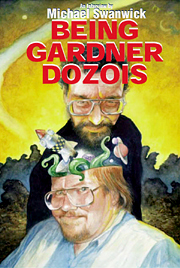
This is not a novel. This is not Michael Swanwick, disdaining so pedestrian a subject as John Malkovich, spelunking with postmodern glee through the caverns measureless to man of Gardner Dozois's august head (although it would be unwise to think of that as beyond Swanwick). Nor is this a biography, a Swanwick's Life of Dozois, although Swanwick may have Boswellian aptitudes, and Dozois has his Johnsonian attributes. Being Gardner Dozois is, in fact, that rare thing, a book-length interview, author to author. It is very entertaining, and uncommonly valuable in its critical insights.
It's allegedly unwise to compose a review out of negatives, to judge a book by what it is not. But, in a counterfactual spirit (that occasional wellspring of useful ideas), and without in any way derogating this wonderful book: there are certain further things it is not. It is not Dozois interviewing Swanwick, except in flashes, so there is no discovering here why "The Edge of the World" places an American Air Force Base in Lord Dunsany's Toldenarba, why the dinosaur stories in Tales of Old Earth are in fact dreams or figments, or what the hell the conclusion of Jack Faust actually meant. Being Gardner Dozois, further, does not analyze Dozois the Editor (although it shows him in his full powers as a "story doctor"), or Dozois the Man, except (crucially) insofar as his personality and experiences have directly informed his work. There is little here of that so-public figure, Dozois the Gonzo Party Animal. What Being Gardner Dozois does present is a complete picture of Dozois the Writer, by means of a blow-by-blow, text-by-text discussion of his each and every work of fiction, short and long, major and minor. This is very effective criticism, personal, systematic, candid.
So there are quite a few positive assertions to make about Being Gardner Dozois. Michael Swanwick knows Dozois well, and has collaborated with him on a number of stories, so his interviewer's insight is ready made; further, he has a quality of sardonic intelligence that lends his questions an especial bite. There's a remarkable interpersonal chemistry at work here. It's hilarious to see Swanwick pounce with delight on a textual allusion or structural metaphor he's sure lurks in Dozois's text, only for Dozois to shrug bluffly and say, well, it wasn't intentional; but more often, the interrogator is right on target. Yes, responds Dozois, those stories do invoke dream logic. Yes, those childhood fears were all too real. Yes, that soldier, dead or dying as he contemplates the sky, could so easily have been me, back in my G.I. rotations. Yes, this nightmare America is a place I see right around the corner. Yes, I lived in just such a house and became alienated from everyday living just so. Being Gardner Dozois again and again proves its central point: that Dozois is one of the few SF writers whose oeuvre is entirely personal, entirely observed; and all the more powerful for that; and what better way to explore it, then, than through an extended oral dialogue of this sort? The whole point of reading Dozois is to know him, this savage proletarian visionary and poet of our desiccated futures; as interviewer, Swanwick understands him with deep sympathetic precision, and relays that knowledge with exceptional resilient skill.
But over and above the (great) merits of Dozois's own writing—which has, after all, always been spare in quantity, amounting to one novel and four overlapping collections to date—what justifies the time, the expense, of such a long interview? Towards the end of the book, Dozois utters a jocular disclaimer: I didn't initiate the project, it's all Swanwick's fault, he's responsible for this white elephant that five people at most will want to read, couldn't he have written some more of those fine stories of his instead? But discount all facetious modesty. Gardner Dozois has a centrality to American SF that transcends his creative efforts, however striking they are in their own right. He has been editor of the leading SF magazine, Asimov's, since the mid-Eighties; he has edited numerous very influential anthologies, including a host of definitive Best Of the Year compilations; so the aesthetic principles that guide his writing can be said to have governed the evolution of the entire genre in the US and beyond. If you would know what makes a good SF story succeed—what formal tricks, what adumbrations of theme, what compromises of style, what modalities of characterization actually work, read Being Gardner Dozois.
For the textual mechanics are all here to see. Foreshadowing; misdirection (this above all); integration of character with background; world-building; the proper balance of plain and purple prose; plotting; the crafty maintenance of ambiguity; dialect and dialogue; literary outrage; how to collaborate on a story. Everything is exhaustively anatomized, superb examples copiously provided. Yet, sometimes Dozois is utterly frank, and the precept is cautionary: this is why my works aren't on bestseller lists; emulate me at your peril. So even brute commercial failsafes are helpfully delineated, if primarily by demonstration of—that again—what they are not. Thus, in addition to providing one of the finest author interviews since the heyday of Charles Platt, Michael Swanwick has given life to a thoroughly useful fiction-writing manual, gospel from the mouth of the man who likely as not will buy the better stories his utterances inspire. Being like Gardner Dozois—through reading his advice—could be no bad investment.

